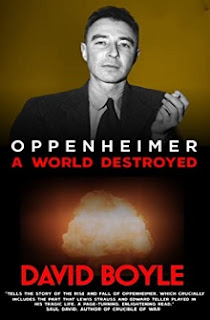This post first appeared at the Radix blog.
Thanks to the film Oppenheimer, by Christopher Nolan which comes out in July, we will all know the full story of how the USA went a little crazy and turned on its own heroes after World War II.
Robert Oppenheimer was one of those who was hauled before a tribunal which lasted three weeks in 1954 - which decided, two-votes-to-one, to strip him of his security clearance.
He never quite recovered from his ordeal - until that point, he had been a leading advocate of talking to the Russians - even perhaps, under Truman, putting all the nuclear weapons he had developed under international control.
But in the fraught atmosphere in Washington in those days - when the Soviets appeared to be fast catching up with nuclear technology - this kind of talk seemed deeply suspicious.
He had also made an enemy of Lewis Strauss (pronounced ‘Straws’) - a Washington insider and chair of the Atomic Energy Commission. And it was he who, under Eisenhower, worked successfully to end Oppenheimer’s career.
Strauss is played by Robert Downey Jr in the film - Oppenheimer by Cillian Murphy from Peaky Blinders - so it seemed sensible to me to write about Oppenheimer and to show the parallels between his life and the two men most responsible for his downfall: Strauss and Edward Teller, the father of the H-bomb. you can read about it in my new book.
It was Teller whose evidence at the hearing - not because Oppenheimer was linked to the Soviets - but because of his enlightened and effective work in Washington since 1945:
“If it is a question of wisdom and judgement, as understood by actions since 1945, then I would say one would be wiser not to grant clearance,” he said. “I must say that I am myself a little bit confused on this issue, particularly as it refers to a person of Dr Oppenheimer’s prestige and influence. May I limit myself to these comments?”
The hearing ignored the legal rules of evidence, because it wasn’t a court. So secret documents were not shared with Oppenheimer’s defence team, which had to leave when any of them were discussed. These included an undisclosed transcript of an interview with him from 1943 - when he was directing the Los Alamos research station - by a security man, worried about his visit to California to see a communist ex-lover.
It is difficult to imagine what it must have been like to go through an ordeal like that – the physical strain – without knowing, as we do now, that the world would escape annihilation, anyway for a while, and that the stifling atmosphere of treason and suspicion would lift – slowly, but that sanity was going to prevail again. Harry Dexter White, the US Treasury negotiator at Bretton Woods had, after all, collapsed after giving evidence at his hearing in Congress in 1948, and died two days later.
To some, Oppie seemed his old self afterwards, but occasionally the full horror was clear – his hair had gone white during the hearing. “Much of his previous spirit and liveliness left him,” said the physicist Hans Bethe.
“I think to a certain extent it actually almost killed him, spiritually, yes,” said the nuclear pioneer Isidore Rabi. “It achieved what his opponents wanted to achieve; it destroyed him.”
His security clearance was never given back to him. Yet he had exhausted himself running Los Alamos, the heart of the Manhattan Project. It included physicists from most of the world, and especially most of Europe - who were terrified of the prospects of Hitler getting the Bomb first.
After Hitler died, many of the scientists left - but most of them stayed on for the first test, in July 1945. Whatever happened later, it was an extraordinary achievement.
Now, 70 years after the events of 1954, it is worth remembering that - although the the US political establishment occasionally goes insane - it does recover itself. In the end.
Find out more in my new book, Oppenheimer: A world destroyed.



1 comment:
Świetnie analizujesz dramatyzm i złożoność postaci Oppenheimera. Zgadzam się, że jego życiowa saga to fascynujący przykład walki z własnymi demonami oraz moralnymi dylematami. Opisujesz, jak jego osobiste zmagania i wybory wpłynęły na większy kontekst historyczny, co daje głęboki wgląd w jego postać. To naprawdę interesujące, jak film ukazuje zderzenie geniuszu i jego konsekwencji. Jak sądzisz, czy obecne podejście do takich tematów w kinie zmienia nasze rozumienie takich postaci, czy może raczej potęguje kontrowersje wokół nich?
Post a Comment